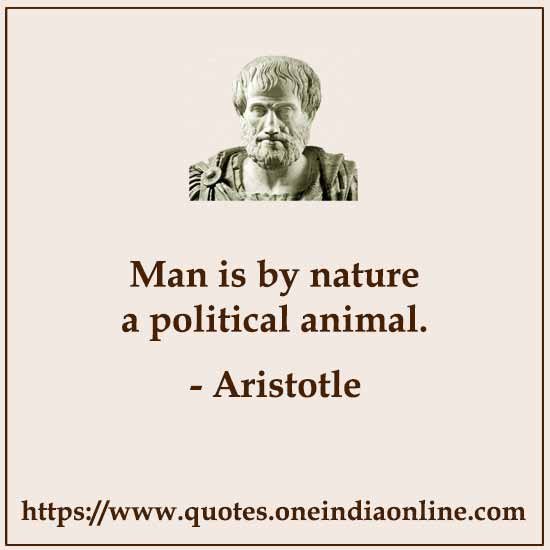Man is by nature a political animal. Aristotle Quotes in English

Aristotle’s quote, “Man is by nature a political animal,” stands out as one of his most recognized insights regarding human beings and their collective existence within society. This statement encapsulates Aristotle's belief that humans are naturally made to live in groups and actively participate in community life, particularly in political matters. The following sections expand on the key ideas behind this famous quote.
First, Aristotle viewed human beings as inherently social creatures. This means that living together in structured groups is a part of what makes us human. In his philosophy, the polis, which refers to the city-state in ancient Greece, represents the highest form of community. Aristotle believed that humans are not only capable of forming communities but are also drawn to create and engage in political systems. This characteristic sets humans apart from other animals. While many animals may exist in social groups, only humans establish organized societies that include laws, governance, and shared moral principles.
Next, the term "political" in Aristotle's statement highlights that being political involves actively engaging in the life of the community, or polis. For Aristotle, political life is about more than simple survival or mere coexistence; it relates to living together in a way that promotes goodness and justice. In ancient Greece, the city-state was a self-sufficient unit where citizens took part in making important decisions regarding laws and governance. This engagement in political life is essential since humans are not just social but also rational beings. They possess the ability to think critically and discuss concepts like justice, ethics, and the common good, adding another layer to their social interactions.
Another vital aspect of Aristotle's view is the role of reason and speech. Humans are unique because they have the capacity for reasoning, which he called logos, and the ability to communicate through speech. These traits allow people to deliberate on important matters related to ethics and politics. Through speech and reason, humans express ideas, create laws, and engage in discussions about what is right and wrong. These are fundamental elements of a vibrant political life and contribute to the functioning of a healthy community.
The significance of political life, according to Aristotle, is to facilitate individual flourishing, which he referred to as eudaimonia, meaning a state of well-being or fulfillment. He believed that a person could only truly reach their potential and lead a meaningful life within the supportive framework of a political community. An individual who lives in isolation, disconnected from others, is seen as incomplete. This is because humans require cooperation, established rules, and social interaction provided by the polis to achieve their fullest potential.
Moreover, Aristotle emphasized the dependency of humans on one another and the importance of political structures for their survival and well-being. On a basic level, people need each other for essential resources like food, security, and companionship. However, Aristotle went further to point out that humans also have a need for ethical discussions and civic engagement. Contributing to the political life of the community is essential for individuals to realize their complete nature and fulfill their roles in society.
Finally, Aristotle’s views imply an obligation for individuals to participate actively in their political community. He argued that being a citizen involves engaging in civic life. According to him, a person is not fully human if they do not take part in political matters; participation in the decision-making processes of the community is central to human development. Aristotle suggests that anyone who lives outside of a polis or refuses to engage in political life must either be like a beast, lacking the qualities of a human, or like a god, being above the needs of human society.
In summary, when Aristotle asserts, “Man is by nature a political animal,” he conveys that humans are instinctively inclined to live in communities and take part in collective decision-making. As social and rational beings, people find their best expression in the context of a political community, or polis, where they can pursue justice and lead fulfilling lives. Political life, in Aristotle's view, is a crucial element for human flourishing, reflecting the natural tendency of humans to participate in societal matters.